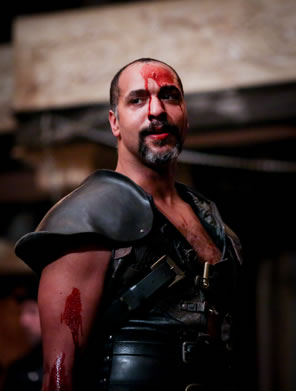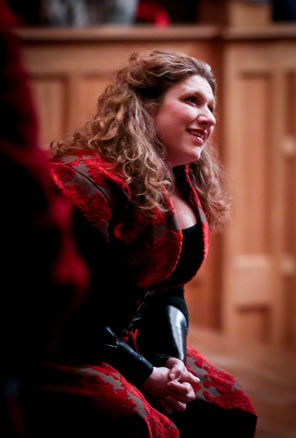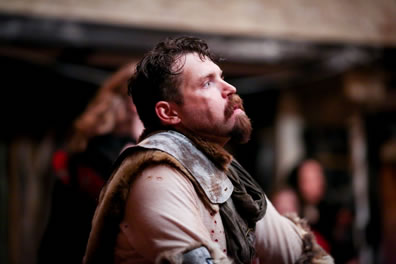Coriolanus
A Man; Take Him for All in All
American Shakespeare Center, Blackfriars Playhouse, Staunton, Virginia
Saturday, January 21 2017, C–6&7 (center stalls)
Actors' Renaissance Season
Here is a description we all would love to aspire to:
His nature is too noble for the world:
He would not flatter Neptune for his trident,
Or Jove for's power to thunder. His heart's his mouth:
What his breast forges, that his tongue must vent;
And, being angry, does forget that ever
He heard the name of death.
What a hero is here portrayed. But, um, this description is given of Caius Martius Coriolanus, the arrogant, elitist, brutally disdainful warrior and would-be dictator of Rome in William Shakespeare's Coriolanus. Sure, the man giving this description, Menenius Agrippa, is Martius's father-like friend, but at this particular moment Menenius is frustrated with Martius, and his assessment is as much criticism as praise.

Caius Martius (René Thornton Jr.) at the battle of Corioli in the American Shakespeare Center's production of William Shakespeare's Coriolanus at the Blackfriars Playhouse. Photo by Lindsey Walters, American Shakespeare Center.
This is the great conundrum of Coriolanus. Is the title character a hero or a villain? What is fact in the play, and what is "alternative fact"? Shakespeare, if not being obtuse, is at least presenting both the character and Roman society and its fickle population and manipulative politicians with dispassionate objectivity. In our age, Coriolanus tends to be antiheroic: There's a reason this play is showing up on an inordinate number of theater marquees this year (along with Richard III, Julius Caesar, and Measure for Measure).
But René Thornton Jr. playing the part for the American Shakespeare Center's production at the Blackfriars Playhouse in Staunton, Virginia, is not an antihero. He is engaging. He is funny in his ways of disdain. He is inspiring as a warrior. He is endearing as a family man. He is excusable in his bent on revenge. Thornton's performance is refreshing and disconcerting because I actually like this guy. I could easily follow Martius even though it's clear in both the things he says and the way he behaves that he will pursue an authoritative course of rule and widen the economic gap between the patricians and the plebeians. But so what? Those plebeians certainly come off as a bunch of wusses.
First, let me assure you I am not writing the above with any bit of satire (or fake news, for that matter). I also know truth from alternative facts: Martius would be bad for the country. Nor has this production pursued a profascist reading of Shakespeare's play (Coriolanus famously has been used by both fascists and communists as representative of their polar opposite views). In fact, this production by its very nature might be as objective a presentation of Shakespeare's text as you will see. This is the second outing of this year's Actors' Renaissance Season at the American Shakespeare Center (ASC) when the troupe of a dozen actors mounts five plays without a director or production team and with a shortened rehearsal time (generally a week from first reading to opening night). They don't have time to conceptualize nor do they have a central guiding vision, so the actors have to find their characters totally on what the text gives them.
They also have to find their own costumes (though, they are quick to point out, the ASC's team of designers helps the actors find what they have determined to wear). That appears to have been quite the endeavor with Coriolanus, which is the most thematically costumed Actors' Renaissance Season production I recall ever seeing. Normally, the cast falls back on period costuming or modern dress with the occasional actor indulging in some thematic hints. This production is uniformly set in a steampunk world, a mash up of gothic Victorian fashion with early industrialized accoutrements and fantastical accessorizing. Menenius (Tim Sailer) wears a red velvet jacket under a gray vest, a studded leather bow tie, a bowler hat with red feather, and vicious-looking leather fingerless gloves. John Harrell as one of the senators is in black knee-length coat, top hat with red and black feather, red and gold vest, red cravat, and gold chain. Cominius (David Anthony Lewis), the consul and Martius's general, has an eye patch (symbolic of the wounds he's earned in service to Rome) and leather shoulder armor with large red horns protruding on either side of the neck. Volumnia (Allison Glenzer), Martius's mother, is in black boots, leggings, a knee-length dress, and red and black flocked sleeveless surcoat with wide black belt. Martius's wife, Virgilia (Jessika Williams), wears a leather-like pieced dress with deep V-neck under a red and gold open robe. Her friend Valeria (Ginna Hoben) is dressed in a red taffeta ruffled belted jacket with long underskirt over black slim pants and thigh-high black boots.
The two tribunes (Benjamin Reed and Chris Johnston) have scarves that serve as their badges of office. All of the Romans wear wristbands, and each has a red feature somewhere in their costumes. The Volscians are in gray and wearing torn and worn hand-me-downs, with Aufidius (Josh Innerst) donning fur and leather elbow pads for battle. The weapons are equally varied, from sticks and clubs to knives and battle axes. Martius uses a Roman short sword, Aufidius wields a silver baseball bat with black tape. The cast has even decorated the playhouse with chains and ribbons hanging from beams, wood columns, and the tiring house.
This visual thematic consistency exemplifies the ensemble-oriented attitude of the cast. The various individual performances also fit into a wide-ranging canvas of personalities and places comprising the puzzle that is Martius Caius Coriolanus (with us costarring as plebeians, soldiers, and senators called on to render chants and cheers). Thornton, shirtless except for a multistrap black vest with gray insets implying armor, certainly is a mighty presence, but his is not a portrayal of stark this-or-thatness. He molds the edges of his character to fit into the social context within which Martius resides and thrives.
He issues one of the most cutting insults in the entire Shakespeare canon, and it's his very first line in the play as he addresses the rabble: "What's the matter, you dissentious rogues, that, rubbing the poor itch of your opinion, make yourselves scabs?" In previous productions of Coriolanus that I've seen, this line establishes Martius's viciousness. Thornton's delivery, however, exemplifies both the man's intelligence and his sharp albeit mean sense of humor. Modern audiences tend to recoil at this line yet laugh at Kent in King Lear assailing Oswald in terms just as mean and more prolonged. Perhaps we don't see ourselves as Oswald (though most of us are) and we already admire Kent, whereas we do identify as "the people" in Coriolanus (especially when, as with this staging, we are "the people") and assess Martius on this first impression as despotically rude.

Volumnia (Allison Glenzer) sits in consultation with her son, Martius, in the American Shakespeare Center's production of William Shakespeare's Coriolanus at the Blackfriars Playhouse. Photo by Lindsey Walters, American Shakespeare Center.
A bit of stage business illustrates what Thornton brings to the role. After the battle of Corioli—where his feats earn him the surname of Coriolanus—Martius has clearly received numerous wounds. We see the blood, but he dismisses its significance, first saying, "The blood I drop is rather physical than dangerous to me," and later claiming it's really Volscian blood from all the slaughter he's done in the city. Yet, when in the triumph his companions raise Martius's arms, Thornton winces in pain. It's a subtle touch, but through such subtleties Thornton shows Martius to be essentially human, a man with a heart (big to some, volatile to others), a soul (stout yet vulnerable), and a mind (insightful but easily clouded by anger).
We not only see this in Thornton's performance but in those of the ensemble. In Lewis's Cominus and Grant Davis as Roman General Titus Lartius are utmost admiration and respect. In Sailer's Menenius is fatherly affection though his political instincts temper that as he tries to coach Martius through his impeachment at the hands of the tribunes. In Reed and Johnston's Tribunes is wariness borne of appreciation. They maneuver against Martius's elevation to consul only by fully comprehending his strengths—his heroism in battle—and his weaknesses—his elitist pride and anger management issues. They adroitly seize on the latter to not only get him ousted as consul but banished from Rome (in their own arrogance, they don't count on his pride also being one of his strengths as Martius joins with Aufidius to invade Rome).
Meanwhile, Martius has the plebeians pegged: "With every minute you do change a mind, and call him noble that was now your hate, him vile that was your garland." This flock of simple sheep (including us, by the way), unquestioningly conforming to what's trending and letting simple values bend to the wind, is exemplified by the wonderfully fickle performance of Lauren Ballard as "the great toe" of the assembly.
Martius's greatest credit is in his wife, as Williams plays Virgilia with a stoic nature and a deep, deep love for her husband, the kind of love from such a kind of woman that a man must earn—and Thornton's Martius knows it, too. As does Volumnia: Glenzer and Williams establish a mother–daughter-in-law relationship that is still coalescing around the object of their mutual adoration but already grounded in mutual respect for each other, too.

Aufidius (Josh Innerst) reacts to Martius giving in to his mother's appeal not to sack Rome in the American Shakespeare Center's Actors' Renaissance Season production of William Shakespeare's Coriolanus at the Blackfriars Playhouse. Photo by Lindsey Walters, American Shakespeare Center.
One of the production's most fascinating performances is Glenzer as Volumnia. The part allows an actress great range to present power, spirit (even of the snarky kind), wisdom, pride, and unbounded motherly devotion. Glenzer, however, reins all that in to a portrayal of restraint and grace. In a production of nonstop action, the highlight moment comes right in the middle when Volumnia lectures Martius on how to corral his pride when presenting himself to the people in his campaign for consul. "You are too absolute," she snaps at him. But then the scene turns tender as she sits down next to him for a moment of private consultation as the rest of the cast gives them space. Glenzer and Thornton slip out of their public veneers as Volumnia and Coriolanius and become mom and Martius, conversing honestly and easily with the comfort level of a guiding mother and her eager-to-please-her son. As Glenzer's Volumnia offers advice, Thornton's Martius listens, really listens. Sometimes the best acting comes not when the actor is speaking but listening, and that is what Thornton accomplishes so touchingly here.
Listening is also the key to another superlative performance, that of Innerst as Aufidius. Naturally, in the climactic supplication scene, it's hard to take your eyes off Glenzer and Thornton as Volumnia presses her case to save Rome with all the logic and passion she can muster while the Volscian-allied Martius withstands her appeal with all the fortitude he can manage. However, Innerst is the one to watch, his Aufidius intently—and expectantly—observing. In Volumnia lies all of Aufidius's hopes: to either sack Rome behind Martius, whereupon Aufidius accomplishes great service to his country even if he doesn't get credit; or to see Martius give in, whereupon the path opens for Aufidius to defeat him once and for all. You sense Aufidius knows which way this scene is heading, for when Martius does relent, Innerst bears an expression of disappointed validation.
Aufidius, in fact, is the last piece to fit into the puzzle that is Martius Caius Coriolanus. In his anticipatory bearing in the final scene, Innerst reveals a character that, all along, has not just been Martius's greatest warrior foe but his mirror image, too. "My rage is gone," he says starting off the play's last speech after he orchestrates the assassination of Martius. "Though in this city [Corioli] he hath widowed and unchilded many a one, which to this hour bewail the injury, yet he shall have a noble memory."
Shakespeare is dispassionate to the end of this play. Not so his Martius, however; Aufidius's benediction would please him well.
Eric Minton
February 10, 2017
Comment: e-mail [email protected]
Start a discussion in the Bardroom



 Find additional Shakespeareances
Find additional Shakespeareances